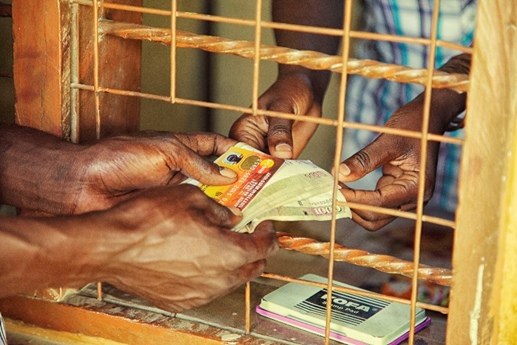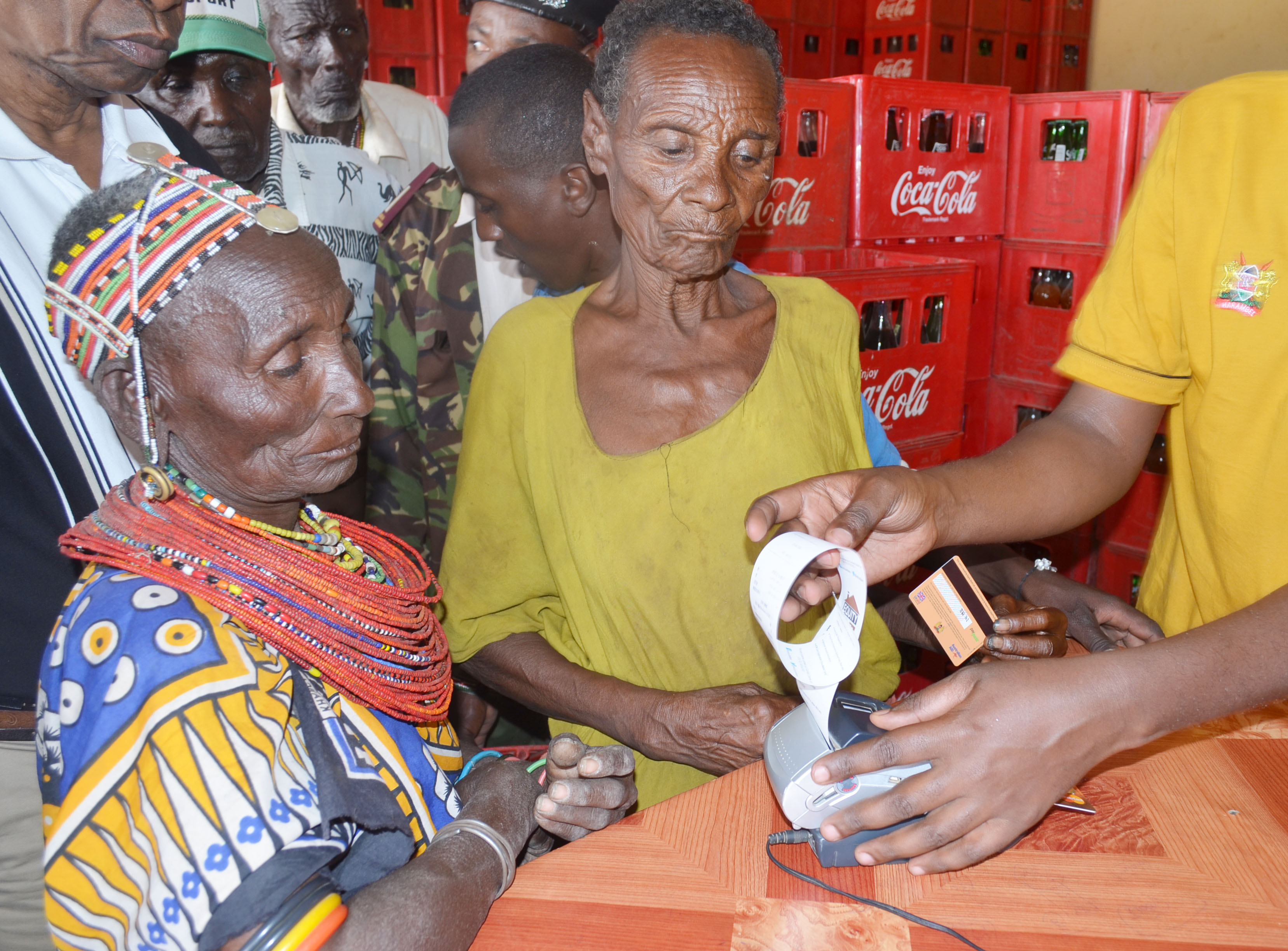Feedback from HSNP beneficiaries
 Findings from the qualitative impact evaluation report for HSNP2 by OPM reveals that, beneficiaries across the four Arid counties of Turkana, Wajir, Mandera and Marsabit, use the bulk of their cash transfers on consumption expenditure. These include food and other household essentials.
Findings from the qualitative impact evaluation report for HSNP2 by OPM reveals that, beneficiaries across the four Arid counties of Turkana, Wajir, Mandera and Marsabit, use the bulk of their cash transfers on consumption expenditure. These include food and other household essentials.
In regards to food, beneficiaries spent cash transfers to have more frequent, larger and diverse meals. The study reveals that during the first few days of receiving a payment cycle, majority of the beneficiaries buy “luxury” food items that include meat, rice, pasta, sugar, vegetables and fruits. Thereafter, beneficiaries buy staple food that includes maize, flour and beans for consumption until the next payment cycle. The cash transfers enable HSNP households to have frequent and larger portion meals as opposed to non-HSNP HHs. The study reveals that smaller households are more likely to increase the portions and diversify the diets to the benefit of vulnerable members that include the elderly, children, lactating and pregnant mothers. In regards to the elderly, they benefit from purchase of “soft” foods that include rice, porridge, vegetable, fruits and milk. Other household essentials purchased using HSNP cash transfers include: beddings, utensils, clothes, schools and furniture.
Besides buying food and other household essentials, HSNP beneficiaries use the cash to cater for education expenditure. In Kenya, both Primary and Secondary education in public school is free of charge. However, there are expenses incurred in accessing education. This includes: uniform, shoes, stationary, sanitary products for girls, transport costs if in boarding schools among others. Majority of HSNP households have school going household members. Anecdotal evidence shows that expenditure in education support children to stay in school hence, improve academic performance.
HSNP cash transfers are also used in improvement of homestead structures. This includes: converting earth floor to concrete thus improving sanitation, repairing of leaking roofs, extending rooms for more space, building of sanitary facilities that include toilets and bathrooms among others. Improvement of households’ structures has a direct influence on the social status of a household and how the wider community perceives it.
 Spending on health expenditure is also one of the ways in which HSNP beneficiaries use their cash. The cost of accessing health services across the four poorest Arid counties is exorbitantly high and largely because of: high cost of transport because of the vast distances to health facilities that have adequate medical facilities and qualified staff, treatment and medicine. In January 2018, the government of Kenya adapted a universal health coverage initiative under the Big Four agenda, where, households will access a Health Benefits Package- to protect vulnerable Kenyans and reduce health disparities. Some counties such as Nairobi, Kirinyaga, Kisumu and Lamu have already taken up the initiative of providing free National Health Insurance Fund (NHIF) coverage for the poorest households using their county budget allocations. The universal health coverage for the poorest and most vulnerable cash transfer beneficiaries will unlock a significant portion of their cash transfers for use in improvement of their well-being thus protecting households from selling off their assets to cater for high costs of health services.
Spending on health expenditure is also one of the ways in which HSNP beneficiaries use their cash. The cost of accessing health services across the four poorest Arid counties is exorbitantly high and largely because of: high cost of transport because of the vast distances to health facilities that have adequate medical facilities and qualified staff, treatment and medicine. In January 2018, the government of Kenya adapted a universal health coverage initiative under the Big Four agenda, where, households will access a Health Benefits Package- to protect vulnerable Kenyans and reduce health disparities. Some counties such as Nairobi, Kirinyaga, Kisumu and Lamu have already taken up the initiative of providing free National Health Insurance Fund (NHIF) coverage for the poorest households using their county budget allocations. The universal health coverage for the poorest and most vulnerable cash transfer beneficiaries will unlock a significant portion of their cash transfers for use in improvement of their well-being thus protecting households from selling off their assets to cater for high costs of health services.
A number of beneficiaries interviewed during the qualitative impact evaluation study shared that, HSNP cash transfers has enabled them improve their creditworthy because they are able to access credit in times of need to smoothen consumption expenditure in between payment cycles. HSNP cash payments are regular and reliable and community regards it as salary. In addition, local traders are ready and willing to give credit to HSNP households because they see them as less risky and are assured of payment of debts.
In the pastoralist communities, women are doubly vulnerable because they are member of the largely marginalised communities. Women are excluded from decision-making processes and this weakens them in society. However, this is different in HSNP because 60% of primary recipient registered households both for regular and drought emergency payment are by default, women. HSNP cash transfers are delivered through fully-fledged Equity Bank accounts and households are requested to nominate those that will collect money on their behalf. 60% of households nominated women as their primary recipient because: HSNP cash transfers are household entitlement and traditionally in the pastoralist communities, women are in charge of responsibilities within the households’. In addition, during drought periods, men move with livestock in search of pasture and water, living behind women to collect the cash. Women beneficiaries shared that HSNP has also promoted their financial inclusion across the four Arid Northern counties. They can now contribute in making financial decisions that include how the money should be spent- this is a big achievement.
As shared 60% of primary recipient of HSNP cash transfers for both regular and scale up households are women. In addition, the study revealed that women were increasingly involved in income generating activities that improve the livelihood of their households e.g. starting small businesses, complementing already existing, buying livestock for selling. Some of the income generating activities include: starting table “kiosks” for selling goods such as sugar, flour, cereals, vegetables, clothing, buying of donkeys and carts for transport business, building of sheds for rentals. Some of the beneficiaries that received arrear payments bought motorbikes for transport business popularly known in Kenya as “boda bodas.”
Overall, the report noted that the cash transfers had improve the psychosocial well being of the beneficiaries. This is because, beneficiaries i) have frequent and more diverse meals ii) can invest in assets iii) are credit worthy iv) are less likely to sell off their limited assets to cope with drought v) have more livelihood options vi) pay for casual labour thus creating employment and vii) can share with neighbors and relative thus improving their social standing in their community.
All in all, HSNP has had a positive impact on the households that receive the social assistance. Both the qualitative and quantitative impact study reports capture the impact not only for the households but also the wider communities.
By Carrie Ndoka
Communications Specialist
HSNP PILU
